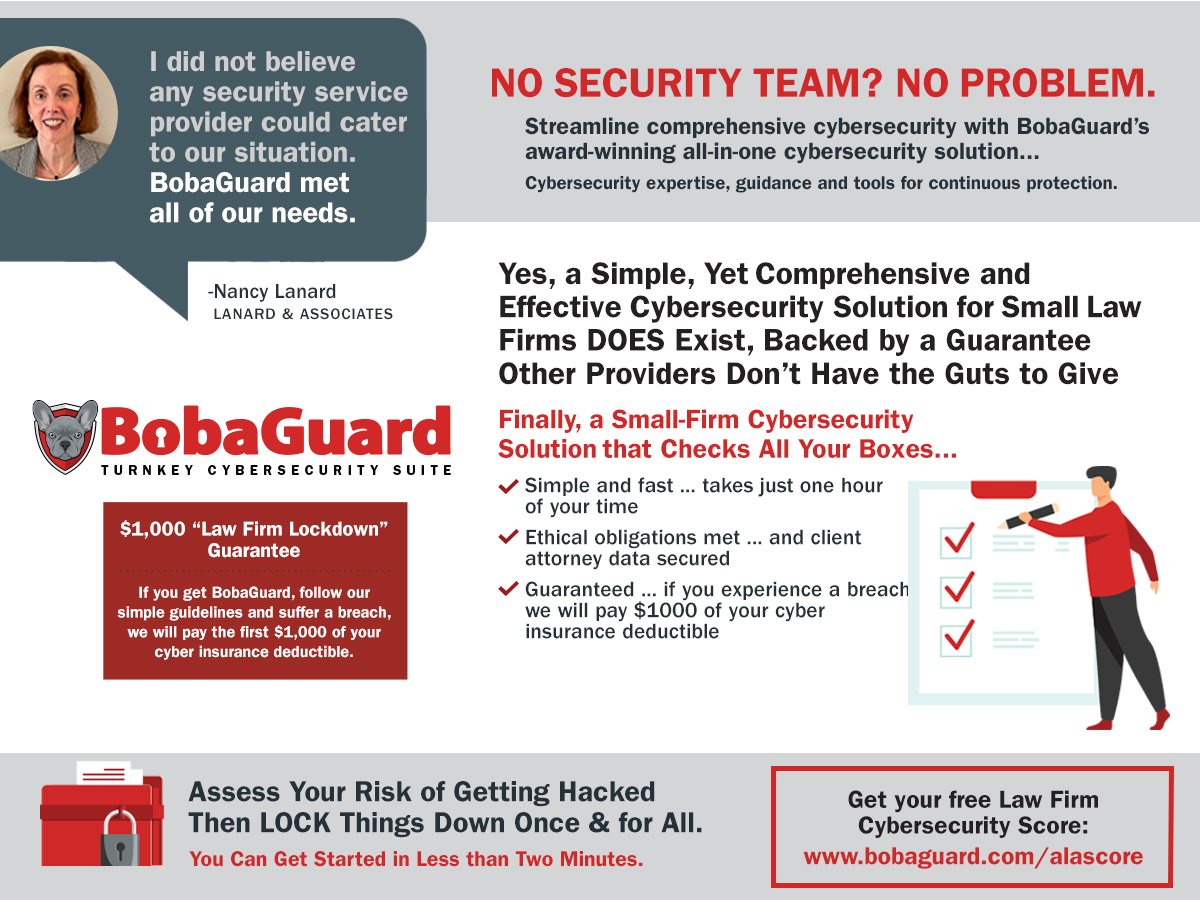After a decade of successfully running Valorem, they were particularly interested in the fact that Elevate, a global law company, did “everything legal” for companies and other law firms other than practice law in the traditional sense. They knew that the market was evolving and that in-house law departments were looking for services like consulting, legal operations and e-discovery, but they also knew that being able to handle the practice of law for those same customers would create an end-to-end solution. That’s when they decided to join forces with Elevate.
At that time, in 2018, there were no states that were allowing outside ownership for a law firm, so they formed a traditional law firm in Illinois under the standard rules of ethics. They would then pitch clients together with Elevate and provide services alongside one another. But when Arizona and some other states started talking about alternative business structures (ABS), they seized the opportunity to provide clients with a one-stop shop for all issues that impact law departments and their attorneys.
It became a natural fit for Elevate to obtain a license in Arizona for its law firm called ElevateNext. The Arizona ABS directory shows that ElevateNext is 100% owned by Elevate Services, Inc. (Elevate also owns an ABS firm in the United Kingdom.)
Ultimately, this helps those in need of legal services. “[From my perspective,] the client benefits the most because the majority of what a client needs for routine work in the current structure requires the client to use multiple sources,” says Auerbach. “Having one place to go for the end-to-end service, with one fee agreement and one primary point of contact for all of their needs is a huge plus for them. They receive a coordinated effort that is efficient, effective and at a lower cost than under the traditional legal business model.”
Remember, ElevateNext is a law firm operating as an ABS, owned by Elevate. The focus is on routine, run-the-company matters that require lawyers in the mix, but also the other services that Elevate provides. The firm currently focuses on providing litigation services such as handling subpoena responses and portfolios of litigation, privacy matters, compliance matters, negotiation and contract review, as well as corporate formation and related corporate work. Elevate brings technology for efficiency; designs and executes workflows and processes for repeat matters; creates large, global teams for managed services that can be done at scale; and has the geographic scope that allows the ABS to provide services at lower cost than traditional law firms, as well as around-the-clock resources.
“Having one place to go for the end-to-end service, with one fee agreement and one primary point of contact for all of their needs is a huge plus for [clients]. They receive a coordinated effort that is efficient, effective and at a lower cost than under the traditional legal business model.“
They found the process of getting the ABS license took time, effort and a lot of documentation, but otherwise went smoothly. Having some of their lawyers join the Arizona Bar was a process. Character and Fitness portions of the ABS application are similar to the disclosure process for becoming an attorney.
NEW LEGAL PATHWAYS
Auerbach’s path is one that is becoming more accessible as more states see the successes such structures can offer, especially in bridging the gap for legal access. In July of this year, the Oregon Supreme Court also jumped on board by granting final approval to a licensed paralegal program that the Oregon State Bar had been developing since 2017.
In a field that can lack innovation, there are now new and innovative career opportunities for those legal professionals who don’t practice law.
Let’s look specifically at Arizona.
The Arizona Supreme Court began licensing the ABS in January 2021, opening the door for legal professionals who do not practice law to invest in law firms and profit-sharing within firms.
An ABS is nothing more than a law firm that has much more flexibility in ownership and investment income so long as it follows the regulations set forth in ACJA 7-209. Various business models are already emerging in Arizona.
For example, Donna Owen is a licensed paraprofessional who works at Udall Shumway in Mesa, Arizona. As an Arizona legal paraprofessional, she is licensed to represent clients in family law cases with the limitations outlined in ACJA § 7-210.
This new licensing procedure now allows licensed paraprofessionals in Arizona to provide legal services in limited practice areas much in the same way as a physician’s assistant is licensed to provide medical services to patients. Licensure is currently available in the areas of “family law,” “limited jurisdiction civil law” and “criminal law.” Plans are underway to include “administrative law” in the future. The use of the title “legal paraprofessional” comes with many qualifying requirements as outlined in ACJA § 7-210.
Another example is if an estate planning law firm wanted to partner with a CPA firm, they have numerous ways to structure their newly formed ABS:
- The CPA firm could purchase the law firm and operate it as a wholly owned subsidiary of the CPA firm. The lawyers in the subsidiary might have 0% ownership in the business while continuing to operate independently to provide legal services. The CPA owners would likely absorb the accounting functions of the firm, payroll and other administrative departments, such as human resources, IT, marketing, etc.
- The CPA firm and the law firm could merge, and each retain a percentage of ownership. They would again likely restructure the merged firm for efficiency and growth, maximizing the strengths each brings to the new firm. Any percentage of the ABS could be assigned to prior owners of each business and, if desired, highly talented legal professionals (beyond practicing lawyers) who were integral to the success of the new company could also be assigned a percentage of ownership both as a reward for their work and as an enticement to remain with the newly structured firm.
- The CPA firm could bring in a group of investors to partner with them on the purchase of the law firm. The current owners of the firm could use this purchase as a succession plan and leave the practice. The new ABS would retain some or all remaining lawyers, and likely, immediately begin hiring additional lawyers. Again, there could be a restructuring of the business keeping the most talented and valuable personnel.
That begs the obvious question, according to Lynda Shely, Founder of The Shely Firm, PC and participant in the drafting of these regulations in Arizona: “What happens to the practice of law in these ABS law firms, especially if there are no lawyer owners? [The regulations state that the Arizona] compliance lawyer must be at least an employee or a manager of the ABS and a member in good standing of the State Bar of Arizona. They must possess experience in the legal field to ensure that the ethical obligations, protection of the public and standards of professionalism are adhered to,” she says.
This standard of conduct is regulated by the licensing process and if an attorney is unduly influenced as to how they practice law or if anyone other than an attorney is practicing law or interfering with the lawyer’s independent professional judgment in representing a client, the ABS license would be in jeopardy.
“While it is not required by the code, the compliance attorney may need some contractual authority in the ABS or be an owner of the ABS because an employee of a firm may not have sufficient authority within the entity to enforce the policies and procedures required under the rules,” Shely says.
As of publication, 22 companies are currently an ABS in Arizona. They operate in the practice areas of estate planning, tax services, online flat fee transactional services, personal injury, worker’s compensation and mass tort cases, business law, intellectual property, veteran’s rights and sexual abuse and immigration law. These companies may be headquartered outside of Arizona or even in countries outside the United States — but the compliance attorney for every registered ABS is an Arizona attorney, thus assuring entity composition of at least one attorney.
“For skilled functional specialists, paralegals or talented business-savvy executives, there are now new opportunities to share in the profits of the practice of law, while being recognized by these ABS entities for the value that they bring to the table.“
Again, ownership of the ABS may be completely by legal professionals not practicing law — so long as a compliance attorney is identified and only lawyers provide the legal services. Applications for ABS status require that any owner of 10% or more of an ABS entity must be disclosed. Lesser shareholders may not need to disclose ownership, depending on the circumstances of ownership. For instance, one Arizona ABS called eLegacy Law, LLC, is an Idaho company that is owned 90% by attorneys and 10% by a marketing executive (who is not a lawyer). On their website they advertise “estate planning with flat rate pricing using actual attorneys from the comfort of your home.”
I DON’T LIVE IN THESE STATES — WHY DOES IT MATTER?
If you work in the legal industry and do not live in Utah or Arizona, why should you care about this change in legal services?
For starters, other states in the United States are looking into codifying ABS or Multidisciplinary Practice (MDP) entities. Using Utah and Arizona as a reference, any state that already has a licensure process in place for paralegals, court reporters or other legal professionals who don’t practice law could, in a relatively short period of time, conceivably create a model for ABS or MDP licensure in their state. Fees for licensure and renewals of these licenses may soon become another source of revenue for them as well as for their state bar associations.
In Arizona, a portion of the registration fee is reserved for the Arizona State Bar. Registration fees range from $2,000 for Arizona nonprofits to $12,000 for an internationally based ABS. Annual renewals are currently set at one-half the registration fee. Once the application is in process, other fees may apply for investigation(s), mergers and acquisitions of the ABS, disciplinary procedures and reinstatement.
For skilled functional specialists, paralegals or talented business-savvy executives, there are now new opportunities to share in the profits of the practice of law, while being recognized by these ABS entities for the value that they bring to the table. This value might also come in the form of private investment into an already existing law firm that might benefit from an infusion of cash in return for a share of ownership.
Also, ethical considerations may arise if your firm engages in business with another firm that doesn’t have traditional lawyers. Sharing of fees should be carefully considered, and contracts should be clear as to how the fees are earned and shared.
Just as good employees do not always make good managers, in today’s world, it may be true that good lawyers may not always be the best law firm owners. In some cases, they and their firms would better thrive if ownership of the firm is shared with others — employees, investors or other businesses, to name a few. No matter who the owners are, excellent leadership and proficient management are key to high-quality, ethical performance and the business success of any law firm.
These developments can make legal access more of a reality for many, while also opening up new opportunities in legal, particularly for ALA members.
“This is a really exciting time to be practicing law. We have had a phenomenal reaction from customers,” says Auerbach. “I applaud Arizona for taking the steps they have taken, and I look forward to further developments in legal reform from other states in the future.”


